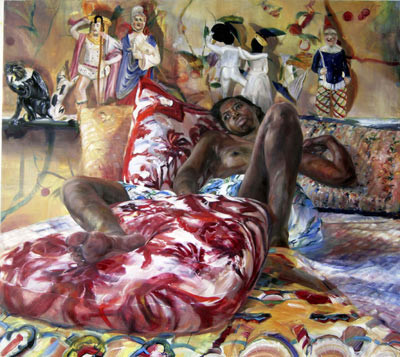The Aggression of Beauty II
15 May - 23 Jun 2007

Natalie Frank, The Hangman has Gone to Wash, the Soldiers to Eat, We are Left Alone with our Feat, 2007, oil on canvas, 182,9 x 203,2 cm / 72.01 x 80 inch
The Aggression of Beauty II
Boulatov, Burgert, Calle, Delvoye, Frank, Melgaard, Moore, Muntean/Rosenblum, von Plessen, Tyson, White, Zipp
15 May - 23 June 2007
“Wer die Schönheit angeschaut mit Augen, ist dem Tode schon anheimgegeben.”
“He who hath set his eyes on beauty has already committed himself to death.”
August Graf von Platen-Hallermünde (1796–1835)
In his poem „Tristan“, the poet August Graf von Platen-Hallermünde describes a feeling that I would like to describe as “The Aggression of Beauty”.
In 1996, I already tried to grasp the aggressive aspect of beauty in an exhibition of that title– as a moment when we actually fear the possible fulfilment of our deepest wishes and longings, and are willing to destroy what we love, or to give up the struggle for beauty and perfection in order to avoid the loss of this love, or escape from the pain.
Platen-Hallermünde’s inner conflict, unhappily moving between being a poet and a soldier – as an artistically gifted man and lover in a world of crises and conflicts, oscillating between poetry and Prussia’s warmongering – he can be read as a representative for an entire generation at the beginning of the nineteenth century, which on another level also exists in the twenty-first century.
While a large part of the world’s population suffers from hunger and poverty and is faced by existential crisis, the other part, wealthy, strives for perfection and beauty. This gap cannot be bridged by politics or religion – nobody has confidence anymore that they can fulfil hopes and wishes, and thus human beings see themselves thrown back on themselves, alone.
They look inward, long for beauty everywhere and seek diverting satisfaction in the world of luxury, or seek the path of a new spirituality.
The felt threat to happiness is not just based on the external circumstances of reality, but the idea of a possible fulfilment of that happiness by itself becomes a threat. The courage to accept what is valuable and beautiful in all its transience seems to be lacking.
This is what “The Aggression of Beauty II” is about, and about the fine line between beauty and pain.
Matthias Arndt
Boulatov, Burgert, Calle, Delvoye, Frank, Melgaard, Moore, Muntean/Rosenblum, von Plessen, Tyson, White, Zipp
15 May - 23 June 2007
“Wer die Schönheit angeschaut mit Augen, ist dem Tode schon anheimgegeben.”
“He who hath set his eyes on beauty has already committed himself to death.”
August Graf von Platen-Hallermünde (1796–1835)
In his poem „Tristan“, the poet August Graf von Platen-Hallermünde describes a feeling that I would like to describe as “The Aggression of Beauty”.
In 1996, I already tried to grasp the aggressive aspect of beauty in an exhibition of that title– as a moment when we actually fear the possible fulfilment of our deepest wishes and longings, and are willing to destroy what we love, or to give up the struggle for beauty and perfection in order to avoid the loss of this love, or escape from the pain.
Platen-Hallermünde’s inner conflict, unhappily moving between being a poet and a soldier – as an artistically gifted man and lover in a world of crises and conflicts, oscillating between poetry and Prussia’s warmongering – he can be read as a representative for an entire generation at the beginning of the nineteenth century, which on another level also exists in the twenty-first century.
While a large part of the world’s population suffers from hunger and poverty and is faced by existential crisis, the other part, wealthy, strives for perfection and beauty. This gap cannot be bridged by politics or religion – nobody has confidence anymore that they can fulfil hopes and wishes, and thus human beings see themselves thrown back on themselves, alone.
They look inward, long for beauty everywhere and seek diverting satisfaction in the world of luxury, or seek the path of a new spirituality.
The felt threat to happiness is not just based on the external circumstances of reality, but the idea of a possible fulfilment of that happiness by itself becomes a threat. The courage to accept what is valuable and beautiful in all its transience seems to be lacking.
This is what “The Aggression of Beauty II” is about, and about the fine line between beauty and pain.
Matthias Arndt
